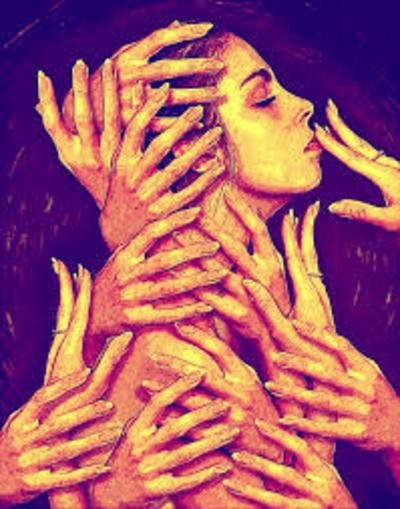ADSactly Poetry - The rebellion of the muses

The rebellion of the muses

In today's delivery, I want to bring just the opposite. Today we will see some poems where the women raise their voice of protest, they reveal themselves against the social and family patterns that say what a woman is and how she should behave. This selection, like the previous one, is from the aforementioned anthology and poems by Venezuelan women poets of the 20th century. I hope you enjoy this selection.

I would like to begin with a poem that is exactly opposed to the previous one in which we saw how the mother looks for the way to create a wonderful world for her son, even in spite of personal reality. This poem is by one of the most controversial Venezuelan poets, but also one of the best: Miyo Vestrini, and the poem is titled "The Walls of Spring". We will use two stanzas to exemplify what I mean:
I will not teach my son to work the land
nor to smell the ear
or sing hymns.
You will know that there are no crystalline streams
no clear water to drink.
Your world will be one of hellish downpours
and dark plains.
…
I'll take him to Hiroshima. Seveso. To Dachau.
His skin will fall piece by piece in the face of horror.
and listen with sorrow to the bird that sings...

This poem can be very hard if we give it a simple reading, but when we understand its meaning, we will find that there is love and fear in its lines. In that first stanza we find a mother who refuses to follow the patterns of a society that can regulate people, that tends to idealize hope, that speaks only of positive things and tends to leave the negative things under the carpet. A very handy thought and wielded at all times. This mother will not only tell her son that the reality out there is neither pleasant nor good, but that it is bad and gray. It is more or less what she looks for when she tells us which places she will take him: Hiroshima, Seveso, Dachau. Let's remember that in 1976 in Seveso there was an industrial fire in a chemical plant and that the population still suffers the consequences of that disaster; the same happens with Dachau, the poet mentions it to refer to the Nazi concentration camp that there was in that population; and of course, it refers to Hiroshima by the atomic bomb launched in 1945. If we look at it, the lyrical voice wants to show reality to the son, perhaps, I presume, so that reality does not attack him, to make him stronger, more aware of his role in society.
Another writer who has also written about motherhood, in fact has a whole book of poems called Cuerpo that talks about it and that I invite you to read, is María Auxiliadora Álvarez. In the poem I transcribe below, we see how having a child is such an unequal event, so different in experiences for men and women. Let's take a few fragments:
It is unjust
that you sleep
while we
tactile we seek
clothing
…
It's unfair.
than in the body
do not contain food
that you don't have varicose veins in your legs.
black branches
to go away
and we'll stay.
that you shut up that you hide that you die
at night
…
It's unfair.
That you go away
Complete dry serene
And we'll stay.
And we'll stay.
In this poem we start from a premise: a woman claims from man and life how unfair maternity can be. We also start from what it means to spend the night, to breastfeed and to raise a child. That is why the poetic voice affirms that it is undeserved, for example, that while the woman must get up to feed the child, the man falls asleep, silent, dumb, almost dead. But his claim is not only directed at the man-husband specimen, it also goes against nature itself: why doesn't man get varicose veins, why can't a man breastfeed his child? With these verses we can intuit an overlooked reference to the punishment that God gave to Adam and Eve. In which the man was given work, but it is the woman who is going to suffer the pain and especially the pain of bringing children into the world. In particular, I am struck by that final part of the poem, those last verses that function as an echo, but also as a repeated story, which happens again and again. We no longer talk about taking care of the child at night, but in life. When men leave "complete", it is women who must always remain, destroyed, incomplete.ore aware of his role in society.

To finish and not to make so long this post, I would like to bring you a last poem titled "Mandado" by the poet Eleonora Requena. I will put them in their entirety:
I was told to drink laughter
Drink serena in your armchair
without raising your voice
lullaby mora like a glass that receives
Leave that door open.
"she's quiet"
Don't feel yourself.
soak in the warm water
without hesitation
Don't delay.
Get out of there.
cover wet skin
and always nods.
I almost obeyed
Well, I live
The first thing that attracts the attention of this poem are its short, sharp phrases, like orders. The other is the idea of the two voices: the one that commands and the one that receives the commandments. This shower of instructions is so familiar to any woman in the world that any one of us could be the protagonist of this poem. When it wasn't our parents, it was society that forced us to have certain behaviors, to follow certain rules: close your legs, don't put yourself in the sun, don't eat too much, comb your hair, smile, say hello. A manual made on the basis of the needs of the society in which we live, not those of us, which we must fulfill, follow. But those last two verses make the difference. The "almost obedecí", works as the saving element, determinant: it is obeyed or not. In this case, not obeying, not following or doing what others said is a consequence of being alive, or on the contrary, one lives for not having obeyed.

Sometimes it is better to live in a window without a house than in a house without a window. Sometimes it is better to live without hugs, if later they will become straitjackets. I have never believed in absolute equality between men and women because we simply are not. But I do believe in legal equality, in rights and obligations, and especially in the equality of freedoms. As we have seen, there are women who are letters, words, phrases, poems, books; women who look out of windows, even though there are no windows and they flee, even though their spaces do not have doors. They may not change the world, but surely where they are, where they are heard, they make a difference.
I hope you enjoyed reading this post. Remember that you can vote for @adsactly as a witness and join our server in discord. Until a next smile;)

BIBLIOGRAPHIC REFERENCE
El hilo de la voz. Anthology (2003) Caracas: Polar Foundation. Compilation by Yolanda Pantin and Ana Teresa Torres
Written by @nancybriti
Click on the coin to join our Discord Chat

Witness proposal is here:
Go To Steem Witness Page
In the bottom of the page type: adsactly-witness and press vote.

Use small letters and no "@" sign. Or, click here to vote directly!
Thank you!

Beautiful post
The beauty of the words in the poem covers a much deeper content. The pain of women's pain funds dikeloala become a beautiful string of words, so that when reading as if we were tearing our own stomach while eating ice cream. The delicacy of poetry is felt as a food for a thirsty soul with deep understanding. It's not just rhetoric or sweetening of lips. If we dive further, we will feel the incomparability of the women who are unrivaled. Giving birth to a baby, caring for a child serving a husband and of course this is the way to true happiness
Thank you @nancybriti
Thank you @adsactly
Thank you Steemit
Warm regard from Indonesia
I think there is a lot of sacrifice, but the woman is human: she suffers, she feels, she cries, she lives. She is a complex being, but as a human being she has her limits. There are times when women need to remember those limits and it's good that the word exists. Grateful for always commenting, @rokhani
This article completes the face of the woman presented in your previous work, @nancybriti, because submission and rebellion are two opposing sides of the same issue. The even "natural", "biological", not to say cultural and social, relationship of the woman is marked by that strong opposition. Women poets and the poetic texts they quote are manifest expression of the problematized attitude in front of such conditions. Beautiful illustrations. Thank you for your wonderful post, @nancybriti and also @adsactly.
Thank you for your always accurate comments, @josemalavem. Indeed, submission and rebellion are two sides of the same coin. I think the detail is to look for balance. The woman is like I said in a moment: a poem of rhymed verses, but also of free verses. Hugs
Like the previous one, this publication is very interesting and also guides reflection on the role of women in society. The poems quoted, certainly, have a great burden of rebellion and protest. In "The Walls of Spring" this mother shows her son the reality as it is, without euphemisms, and thus protects him, thus manifesting the natural feeling of the woman-mother. I liked it very much. María Auxiliadora Álvarez's poem is the cries to the universe for the marked and unjust differences between man and woman. With respect to this, I think that in these times things have changed, maternity is also shared by men. Although they do not breastfeed or suffer the ailments of women, they have made more presence in the care of children. from birth. And with the last one you quote, I also agree with your analysis, @nancybriti. Women, beings to obey instructions, but only until the limit of tolerance is exhausted and they rebel. A quality article, thank you @adsactly for spreading it.
As a woman you know how hard it has been for us to be here, you and I writing and writing about women, @aurodivys. We have achieved many goals and many spaces, thank God. There are still, in many countries, silenced women. It's good that there are spaces like this and poetry where women have the opportunity to express themselves. Bravo for us. Greetings
The paintings show the beauty of women as they are and who the paintings show their beauty, their most sensitive side, their pride and most importantly their strength before all the evil that they face throughout their lives.
That's right, @kronozzz123 . Thank you for commenting.
de nada :)
Just Wonderful!
Thank you
Hi, @adsactly!
You just got a 0.5% upvote from SteemPlus!
To get higher upvotes, earn more SteemPlus Points (SPP). On your Steemit wallet, check your SPP balance and click on "How to earn SPP?" to find out all the ways to earn.
If you're not using SteemPlus yet, please check our last posts in here to see the many ways in which SteemPlus can improve your Steem experience on Steemit and Busy.